#Fermented wheat
Text
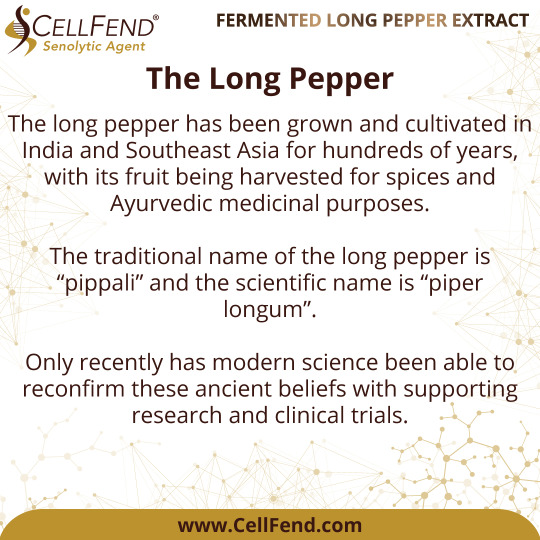
#Fermented wheat#Health supplements#Nutra-Ceuticals#Organic supplements#Organic cranberry supplements
0 notes
Text
The human body is so stupid man
Just bc I had bread and am laying down AN HOUR after I ate, I'm having LOUD painful burps?? Did I ask?? Did I?? No!
#marquilla#i mean i know i have stomach acid disorder but like come on bitch#like it sounds like i chugged a bottle of mtn dew 😭 all i had today since being up for the day was 3 pieces of wheat bread and#like 5oz of grape juice but apparently thats enough to ferment! and create acid and gases to pop!
2 notes
·
View notes
Text
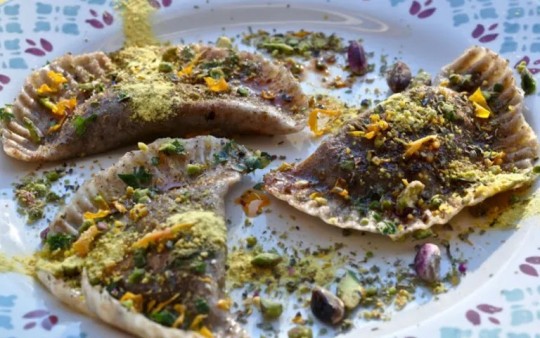
Whole Wheat Radicchio Ravioli (Vegan)
#vegan#pasta#ravioli#dinner#radicchio#fermented tofu#tofu#leeks#whole wheat#spelt flour#mirin#tamari#nutmeg#white pepper#orange#pistachios#cinnamon#turmeric#parsley#!
3 notes
·
View notes
Text
i love beer im naming my next dog ninkasi
0 notes
Text
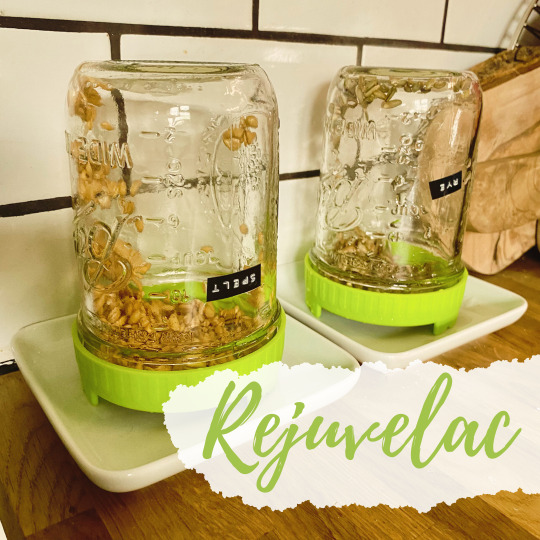
I recently discovered a living raw drink called rejuvelac.
I was very sceptical at first, it seemed the oddest thing to make a drink out of and I was not looking forward to my first sip. Surprisingly very mild and little sweet, quite unexpected.
Aside from being a drink it can also be used as a starter for vegan yogurt or curd.
I’ve opted for spelt and rye.
From Wikipedia, the free encyclopedia:
Rejuvelac is a kind of grain water that was invented and promoted by Ann Wigmore, born in Cropos, Lithuania.[1] The beverage is closely related to a traditional Romanian drink, called borș, a fermented wheat bran that can be used to make a sour soup called ciorbă[2] or as the basis for Vegan cheeses.
#plant based#rejuvelac#elixir#vegan#yogurt starter#Fermenting#wheat berries#rye#spelt#food#sprouting
1 note
·
View note
Text
oh my god i figured it out
okay so it took an accident of me not checking on it, but I FINALLY figured out why I wasn't getting enough loft on my bread:
I was NOT giving enough time for yeast/bacteria production.
So if I do my other bread recipe's 4 hour levain development, then follow the pullman's recipe and do about an hour and a half initial rise (with stretch and folds) with a one hour final rest and rise, I get something like this:
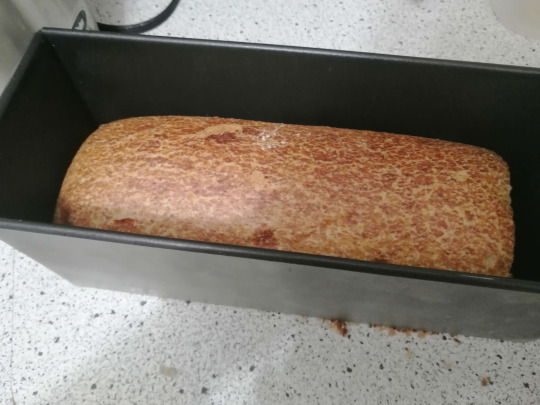
okay that rose in the oven but like. not a whole lot, yknow?
tried again, a little longer on the levain, but this time I tried to do the final rest/rise in the fridge overnight like when you have an overnight ferment on a classic sourdough
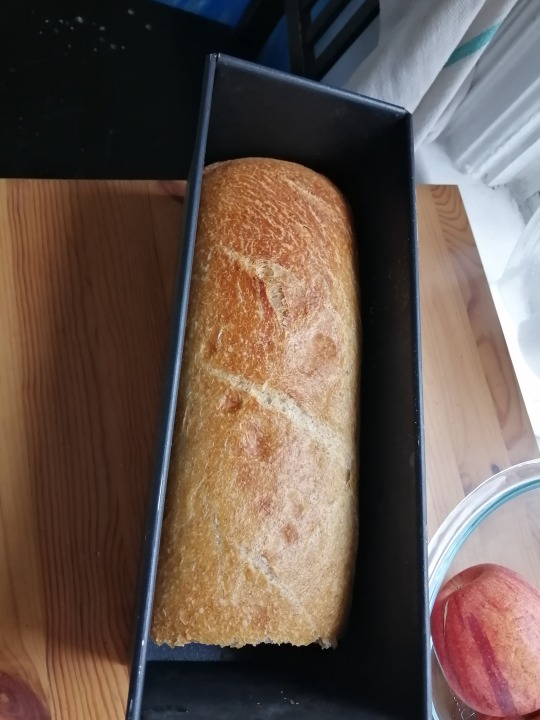
oh that's a lot better! but the recipe is for a PULLMAN'S loaf, it should be square as possible, am I using enough ingredients?
NO I WAS. I JUST WASNT GIVING ALL THE TIMES ENOUGH TIME
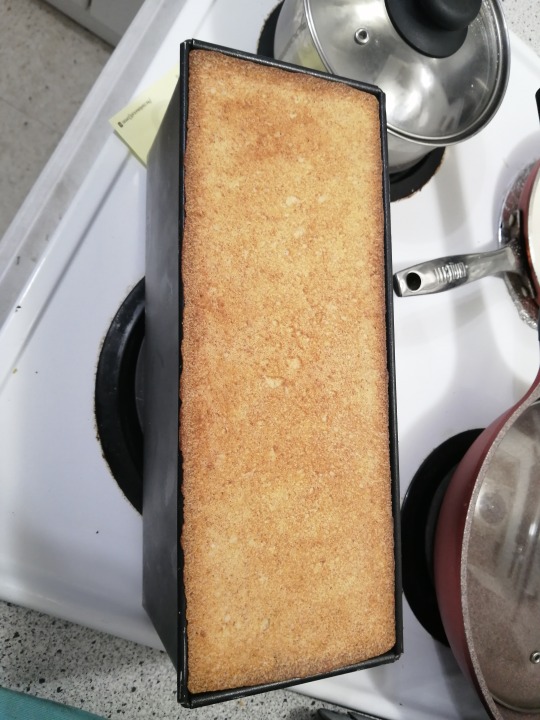
this time I let the levain (40-50g starter, 35g whole wheat flour, 35g AP flour, 70 mL water) develop for like six and a half hours in a proofer or a slightly warmed oven.
pour levain into a stand mixer if you've got one, bowl if you dont. Mix in sugar (35g) and warm water (400mL). Let that sit for the usual half hour in proofer.
add flour (600ish grams total, i often do about a third whole wheat to two thirds AP), 5g salt, 80-90g fat of choice (butter, margarine, etc). I put it in the stand mixer for around 10 minutes on low. (this is a REALLY old stand mixer so it CAN go real slow- do 7-8 min on lowest setting on a modern mixer, 15 min if you wanna do a hand knead)
cover and put in proofer. As usual I did 4 stretch and folds at half hour intervals, but on the final interval I forgot about the timer- it was left in the bowl for around a full hour after the last fold rather than the planned half hour.
by the time I checked on it, it rose WAY more than i was expecting it to. Decided to roll with it (lol), greased the pullman's pan (butter if no one's allergic, margarine otherwise), flattened, rolled up the dough, plopped it in and slid on the lid.
Did the final rest for two full hours in proofing temps, then baked at 350-60ish for a half hour with the lid slid on, 15 min with the lid off.
so, all in all: the ideal loaf of pullman's sourdough starts when you wake up and comes out around dark lunch.
not practical but hey! an interesting study to be sure
2K notes
·
View notes
Text
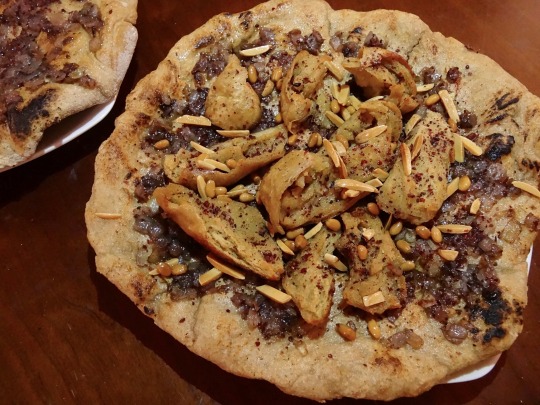

[ID: Two large flatbreads. The one in the center is topped with bright purple onions, faux chicken, fried nuts, and coarse red sumac; the one at the side is topped with onions and sumac. Second image is a close-up. End ID]
مسخن / Musakhkhan (Palestinian flatbread with onions and sumac)
Musakhkhan (مُسَخَّن; also "musakhan" or "moussakhan") is a dish historically made by Palestinian farmers during the olive harvest season of October and November: naturally leavened flatbread is cooked in clay ovens, dipped in plenty of freshly pressed olive oil, and then covered with oily, richly caramelized onions fragrant with sumac. Modern versions of the dish add spiced, boiled and baked chicken along with toasted or fried pine nuts and almonds. It is eaten with the hands, and sometimes served alongside a soup made from the stock produced by boiling the chicken. The name of the dish literally means "heated," from سَخَّنَ "sakhkhana" "to heat" + the participle prefix مُـ "mu".
I have provided instructions for including 'chicken,' but I don't think the dish suffers from its lack: the rich, slightly sour fermented wheat bread, the deep sweetness of the caramelised onions, and the true, clean, bright expressions of olive oil and sumac make this dish a must-try even in its original, plainer form.
Musakhkhan is often considered to be the national dish of Palestine. Like foods such as za'tar, hummus, tahina, and frika, it is significant for its historical and emotional associations, and for the way it links people, place, identity, and memory; it is also understood to be symbolic of a deeply rooted connection to the land, and thus of liberation struggle. The dish is liberally covered with the fruit of Palestinian lands in the form of onions, olive oil, and sumac (the dried and ground berries of a wild-growing bush).
The symbolic resonance of olive oil may be imputed to its history in the area. In historical Palestine (before the British Mandate period), agriculture and income from agricultural exports made up the bulk of the economy. Under مُشَاعْ (mushā', "common"; also transliterated "musha'a") systems of land tenure, communally owned plots of land were divided into parcels which were rotated between members of large kinship groups (rather than one parcel belonging to a private owner and their descendants into perpetuity). Olive trees were grown over much of the land, including on terraced hills, and their oil was used for culinary purposes and to make soap; excess was exported. In the early 1920s, Palestinian farmers produced 5,000 tons of olive oil a year, making an average of 342,000 PL (Palestinian pounds, equivalent to pounds sterling) from exports to Egypt alone.
During the British Mandate period (from 1917 to 1948, when Britain was given the administration of Palestine by the League of Nations after World War 1), acres of densely populated and cultivated land were expropriated from Palestinians through legal strongarming of and direct violence against, including killing of, فَلّاَحين (fallahin, peasants; singular "فَلَّاح" "fallah") by British troops. This continued a campaign of dispossession that had begun in the late 19th century.
By 1941, an estimated 119,000 peasants had been dispossessed of land (30% of all Palestinian families involved in agriculture); many of them had moved to other areas, while those who stayed were largely destitute. The agriculturally rich Nablus area (north of Jerusalem), for example, was largely empty by 1934: Haaretz reported that it was "no longer the town of gold [i.e., oranges], neither is it the town of trade [i.e., olive oil]. Nablus rather has become the town of empty houses, of darkness and of misery". Farmers led rebellions against this expropriation in 1929, 1933, and 1936-9, which were brutually repressed by the British military.
Despite the number of farmers who had been displaced from their land by European Jewish private owners and cooperatives (which owned 24.5% of all cultivated land in Palestine by 1941), the amount of olives produced by Palestinians increased from 34,000 tons in 1931 to 78,300 in 1945, evidencing an investment in and expansion of agriculture by indigenous inhabitants. Thus it does not seem likely that vast swathes of land were "waste land," or that the musha' system did not allow for "development"!
Imprecations against the musha' system were nevertheless used as justification to force Palestinians from their land. After various Zionist organizations and militant groups succeeded in pushing Britain out of Palestine in 1948—clearing the way for hundreds of thousands of Palestinians to be dispossessed or killed during the Nakba—the Israeli parliament began constructing a framework to render their expropriation of land legal; the Cultivation of Waste Lands Law of 1949, for example, allowed the requisition of uncultivated land, while the Absentees’ Property Law of 1950 allowed the state to requisition the land of people it had forced from their homes.
Israel profited from its dispossession of millions of dunums of land; 40,000 dunums of vineyards, 100,000 dunums of citrus groves, and 95% of the olive groves in the new state were stolen from Palestinians during this period, and the agricultural subsidies bolstered by these properties were used to lure new settlers in with promises of large incomes.
It also profited from the resulting "de-development" of the Palestinian economy, of which the decline in trade of olive oil furnishes a striking example. Palestinian olive farmers were unable to compete with the cheaper oils (olive and other types) with which Zionist, capital-driven industry flooded the market; by 1936, the 342,000 PL in olive oil exports of the early 1920s had fallen to 52,091 PL, and thereafter to nothing. While selling to a Palestinian captive market, Israel was also exporting the fruits of confiscated Palestinian land to Europe and elsewhere; in 1949, olives produced on stolen land were Israel's third-largest export. As of 2014, 12.9% of the olives exported to Europe were grown in the occupied West Bank alone.
This process of de-development and profiteering accelerated after Israel's military seizure of the West Bank and Gaza in 1967. In 1970, agriculture made up 34% of the GDP of the West Bank, and 31% of that of Gaza; in 2000, it was 16% and 18%, respectively. Many of those out of work due to expropriated or newly unworkable land were hired as day laborers on Israeli farms.
Meanwhile, Palestinians (and Israeli Palestinians) continued to plant and cultivate olives. The fact that Palestinians do not control their own water supplies or borders and may expect at any time to be barred by the military from harvesting their fields has discouraged investment and led to risk aversion (especially since the outmoding of the musha' system, which had minimized individual risk). In this environment, olive trees are attractive because they are low-input. They can subsist on rainwater (Israel monopolizes and poisons much of the region's water, and heavily taxes imports of materials that could be used to build irrigation systems), and don't require high-quality soil or daily weeding. Olive trees, unlike factories and agricultural technology, don't need large inputs of capital that stand to be wasted if the Israeli military destroys them.
Olive trees are therefore the chosen crop when proving a continued use of land in order to prevent the Israeli military from expropriating it under various "waste" or "absentee" land laws. Palestinians immediately plant olive seedlings on land they have been temporarily forced from, since even land that has lain fallow due to status as a military closed zone can be appropriated with this justification. The danger is so pressing that Palestinian agronomists encouraged this habit (as of 1993), despite the fact that Israeli competition and continual planting had lowered olive crop prices, and despite the decline in soil quality that results from never allowing land to lie fallow. In more recent years, olive trees have yielded primary or supplementary income for about 100,000 Palestinian families, producing up to 191 million USD in value in good years (including an average of 17,000 tons of olive oil yearly between 2001 and 2009).
Israeli soldiers and settlers have famously uprooted, vandalized, razed, and burned millions of these olive trees, as well as using military outposts to deny Palestinian farmers access to their olive crops. It prefers to restrict Palestinians to annual crops, such as vegetables and grains, and eliminate competition in permanent crops, such as fruit trees.
This targeting of olive trees increases during times of intensified conflict. During the currently ongoing olive harvest season (November 2023), Gazan olive farmers have reported being targeted by Israeli war planes; some farmers in the West Bank have given up on harvesting their trees altogether, due to threats issued by organized networks of settlers that they would kill anyone seen making the attempt.
The rootedness of olive trees in the history of Palestine gives them weight as a symbol of homeland, culture, and the fight for liberation. Palestinian olive harvest festivals, typically celebrated in October with singing, dancing, and eating, have inspired similar events elsewhere in the world, aimed at sharing Palestinian food and culture and expressing solidarity with those living under occupation.
Support Palestinian resistance by calling Elbit System’s (Israel’s primary weapons manufacturer) landlord, donating to Palestine Action’s bail fund, and donating to the Bay Area Anti-Repression Committee bail fund.
Ingredients:
For the dish:
2 pieces taboon bread, preferably freshly baked
2 large or 3 medium yellow onions (480g)
1 cup first cold press extra virgin olive oil (زيت زيتون البكر الممتاز)
1 Tbsp coarsely ground Levantine sumac (سماق شامي / sumaq shami), plus more to top
Ground black pepper
For the chicken (optional):
500g chicken substitute
5 green cardamom pods, or 1/4 tsp ground cardamom
4 cloves, or pinch ground cloves
1 Mediterranean bay leaf
1 Tbsp ground sumac
For the nut topping (optional):
2 Tbsp slivered almonds
2 Tbsp pine nuts
Neutral oil, for frying
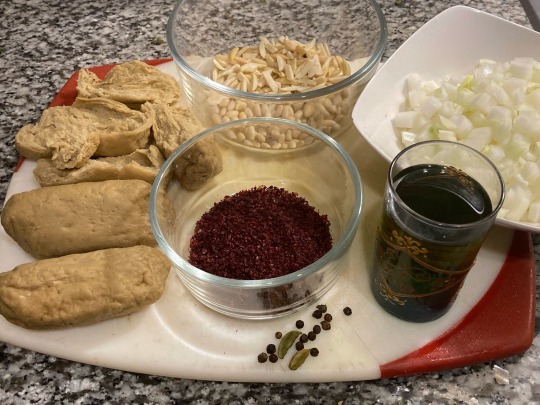
Notes on ingredients:
Use the best olive oil that you can. You will want oil that has some opacity to it or some deposits in it. I used Aleppo brand olive oil (7 USD a liter at my local halal grocery).
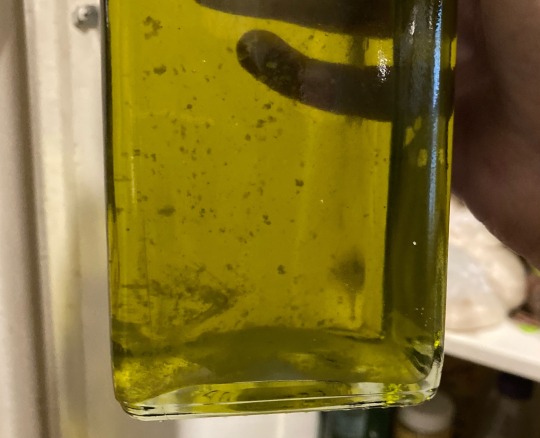
If you want to replace the taboon bread with something less laborious, I would recommend something that mimics the rich, fermented flavor of the traditional, whole-wheat, naturally leavened bread. Many people today make taboon bread with white flour and commercial yeast—which you might mimic by using storebought naan or lavash, for example—but I think the slight sourness of the flatbread is a beautiful counterpoint to the brightness of the sumac and the sweetness of the caramelized onions. I would go with a sourdough pizza crust or something similar.
Your sumac should be coarsely ground, not finely powdered; and a deep, rich red, not pinkish in color (like the pile on the right, not the one on the left).

For this dish, a whole chicken is usually first boiled (perhaps with spices including bay leaves, cardamom, and cloves) and then baked, sometimes along with some of the oil from frying the onions. I call for just frying or baking instead; in my opinion, boiling often has a negative effect on the texture of meat substitutes.
Instructions:
For the onions:
1. Heat a cup of olive oil in a large skillet or pot. Fry onions on medium-low, stirring often, for 10 minutes or until translucent.

2. Add 1 Tbsp sumac and a few cracks of black pepper and reduce to low. Cook for another 30 minutes, stirring occasionally, until onions are sweet, reduced in volume, and pinkish in color.
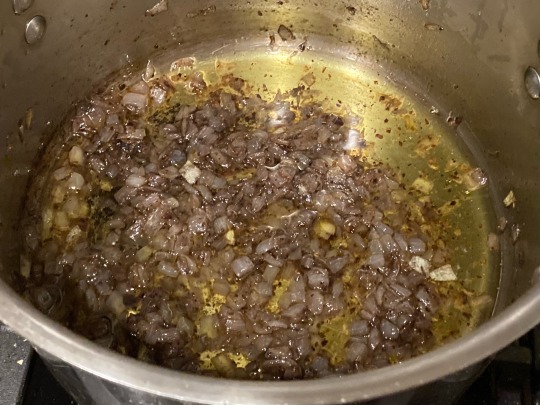
For the chicken:
1. Briefly toast and finely grind spices except for sumac (cardamom, cloves, and bay leaf). Filter with a fine mesh sieve. Dip 'chicken' into the pot in which you fried the onions to coat it with olive oil, then rub spices (including sumac) onto the surface.
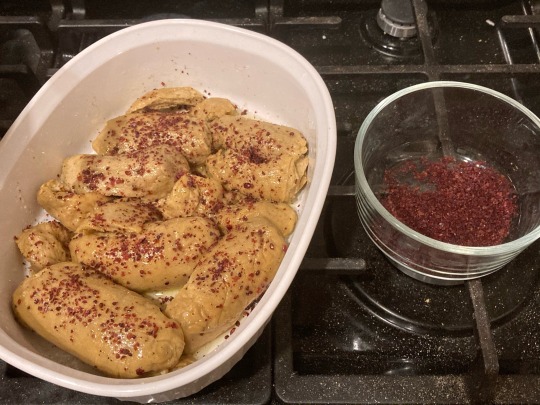
2. Sear chicken in a dry skillet until browned on all sides; or bake, uncovered, in the top third of an oven heated to 400 °F (200 °C) until browned.
For the nut topping:
1. Heat a neutral oil on medium in a small pot or skillet. Add almonds and fry for 2 minutes, until just starting to take on color. Add pine nuts and fry until both almonds and pine nuts are golden brown. Remove with a slotted spoon.
To assemble:
1. Dip each flatbread in the olive oil used to fry the onions, then spread onions over the surface.
Some cooks dip the bread entirely into oil; others press it lightly into the surface of the oil in the pot on both sides, or one side; a more modern method calls for mixing the olive oil with chicken broth to lighten it. Consult your taste. I think the bread from my taboon recipe stands up well to being pressed into the oil on both sides without tearing or becoming soggy.
2. Top flatbread with chicken and several large pinches more sumac. Bake briefly in the oven (still heated to 400 °F / 200 °C), or broil on low, for 3-5 minutes, until the sumac and the surface of the bread have darkened a shade.
3. Top with fried nuts.
Musakhkhan is usually eaten by ripping the chicken into bite-sized pieces, tearing off a bit of bread, and eating the chicken using the bread.
Some cooks make a layered musakhkhan, adding two to three pieces of bread covered with onions on top of each other before topping the entire construction with chicken and pine nuts.
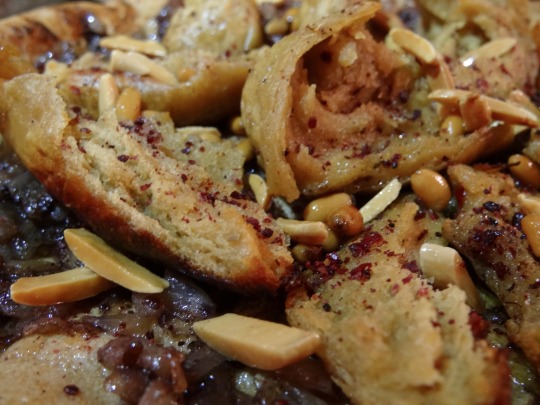
682 notes
·
View notes
Note
apologies if this is outside your scope but do you have any advice on making anthro species cuisine reflect the diets of the animal they are based on, while still having the level of depth that human cuisine has?
oh, i love fantasy cuisine as a concept. It might help to research the diet and then also research human foods with similar ingredients, especially if you can find historical dishes from the area those ingredients originated in!
there are some food types that show up in many different cultures, which can serve as a basis for making fantasy foods.
soups!! making broth is as simple as boiling things in water for a really long time, and broth is the basis for pretty much all soups. it's not limited to meat broths! vegetable broth is also a thing that exists. soup just needs Liquid and Food Chunks. it's very easy.
bread! there are so many different forms of bread in so many cultures. wheat, rye, millet, corn, almond; pretty much any grain or nut (and even other things!) can be turned into flour, and that can be made into some form of "bread" depending on how far you stretch the definition of bread. tortillas, naan, rolls, biscuits, dumplings, etc etc. pan fried, oil fried, baked, boiled, whatever. yeast not required.
alcohol. honestly, one of the most common things in the world. wild animals get inebriated from eating fermented fruit all the time. they could most certainly make alcohol if they were sapient enough to do it on purpose.
preserved foods! pickled things, jams, jerky, fermentation, etc. finding ways to keep food safe for long periods or time is very important in pretty much every culture, and some foods require long term preservation methods to become edible in the first place, like fermented shark.
herbs and spices! number one way to make food more interesting. salt is a bare minimum: a lot of animals seek out salt as a dietary supplement! though your non-primate people species may not be able to eat things like garlic and spicy peppers (since they tend to make most animals sick) there will probably be other flavorful herbs and spices they can add to their food.
I hope that's helpful for you! good luck!
128 notes
·
View notes
Photo


#926.5 - Fidough have been considered companions for humanity for a long time, and can often be found in towns and settlements living among them. The yeast in their breath induces fermentation, making these Pokemon very useful in cooking. Fidough possess a moist, smooth skin that has elastic qualities and is both firm and soft at the same time. When these Pokemon become excited, they intimidate their opponents by puffing up their bodies to appear bigger. As Fidough age into Doughmutt, their doughy hide darkens and begins to emanate a pleasing, appetizing aroma, which helps wheat to grow. Due to this, Dachsbun—fully evolved Doughmutt—are historically treasured by farming villiages. The surface of their skin hardens when exposed to intense heat, providing them with a stronger defense.
Named: Fidough - Doughmutt - Dachsbun
- - - - - - - - - -
Follow for more In-Progress Pokemon evolutions!
FAQ | Social Media | Pokemon Index | Commission Information
#pokemon#fakemon#in progress pokemon#fidough#dachsbun#fairy type#gen9#paldea#pokemon scarlet and violet#doughmutt#named
852 notes
·
View notes
Note
Do you know how our understanding and treatment of diabetes has changed through history?
Oooh good question, anon!
As you may guess, diabetes mellitus is not new.

We've known about it since at least the Ebers Papyrus (1550 BCE) when the disease and a treatment was first described. This treatment was: "a liquid extract of bones, grain, grit, wheat, green lead and earth." I did not look these up, but I would guess they did not do a whole lot for the treatment of diabetes.
Later during the 6th century BCE it was first given a name when it was described by Hindu physician Sushruta as madhumeh or "honey urine."
Honey urine is a very apt descriptor for diabetes. In any type, one of the most measurable symptoms is that the person urinates a lot, and the urine tastes sweet (or, if one didn't feel like tasting, that it ferments, or that it attracts ants). This was also the first test for diabetes.
The reason for the sweetness of the urine (as well as a lot of other general info about diabetes) is spelled out more clearly in my "Don't Be That Guy Who Wrote Hansel and Gretel: Witch Hunters" post.
A Greek physician Apolonius of Memphis named it Diabetes, meaning "to siphon" (referring to the large amount of urine lost).
Roman physician Aretaeus later made the first precise description of diabetes. This included the classic symptoms of incessant thirst, copious urination, and constant hunger leading to emaciation and death. He also notes that if deprived of water, the patient will continue to urinate until they become so dehydrated that they die.
The term "Mellitus" was not added until the 1600s by an English physician Thomas Willis. This was again due to the sweetness of the expressed urine. Willis prescribed a diet of "slimy vegetables, rice, and white starch. He also suggested a milk drink which was distilled with cypress tops and egg whites, two powders (a mixture of gum arabic and gum dragant), rhubarb and cinnamon". Supposedly his patients improved if they kept to this diet, though few managed it long term. I honestly don't know how it would have worked, even temporarily.
A major breakthrough came in 1889 when it was discovered that if you removed the pancreas from a dog, the dog would become diabetic (particularly, that it would urinate large quantities of sweet urine). Up until this point it was thought that diabetes stemmed from the kidneys and bladder, or perhaps the lungs. This was the first time it had been shown experimentally that the pancreas was the problem.
Speaking of this, this was also part of a series of experiments where an English physician named Merkowski implanted a small amount of pancreas in the pancreas-less dog's fat, which reversed the diabetes temporarily. This proved that the pancreas was making something that helped regulate blood (and thus urine) sugar.
What this was wasn't figured out until 1921, when Canadian scientists Banting and Best (with help from McLeod and Collip) isolated something they called insletin (after the islets of langerhans, where the substance was being produced). It's important to note that all of these scientists hated each other so much they almost refused a Nobel Prize over it. Later, Collip would refine the substance and McLeod would rename it insulin.
Prior to insulin existing there was basically 1 vaguely useful treatment for diabetes. Unfortunately, that was starvation. So you could either die a slow and painful death by diabetes or you could die a slightly less slow but still painful death due to eating about 500 calories per day. Either way, diabetes was fatal, usually within a couple of years of diagnosis.
By 1923, the first commercial insulin product, Iletin, had been developed. Iletin was a U10 insulin (10 units per 1 milliliter- less potent than today's U100 and U500 insulins) and was made from pork pancreases. It took nearly a ton of pork pancreas to make 1oz of insulin. Fortunately, as a byproduct of the meat industry, pancreases were readily available.
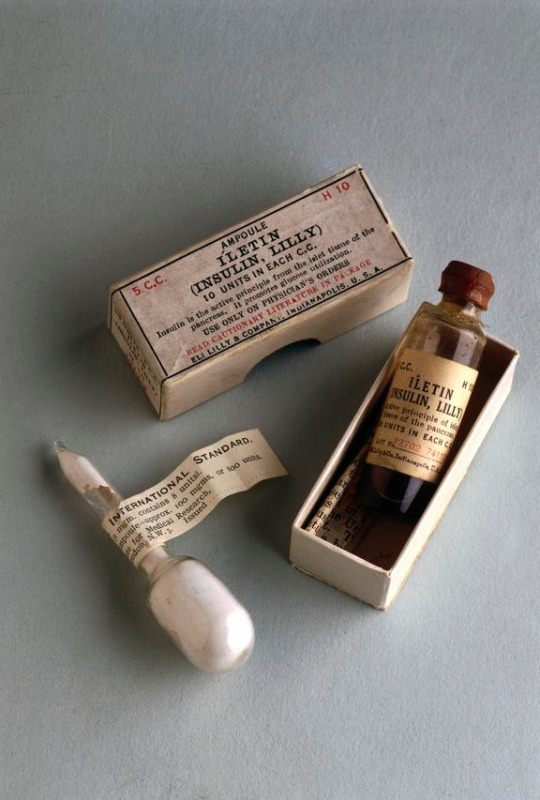
Now, you might be thinking- no one has mentioned type 1 or type 2 yet in this entire post!
Well, you would be right, because diabetes wouldn't be split into 2 forms (insulin-dependent and non-insulin dependent) until 1979, and wouldn't be classified as types 1 and 2 until 1995. That's right- some of you were alive when there was only one kind of diabetes out there.
Now, there's more about the types in the Hansel and Gretel post, but essentially type 1 diabetes occurs when the pancreas itself stops producing insulin, usually in childhood. When this happens, the body stops being able to use sugar (insulin, a hormone, acts as a "key" to let sugar into cells for use). Without replacing that insulin, the person dies because their cells starve.
Type 2 diabetes occurs when the pancreas still produces insulin, but the cells stop responding to it correctly. This causes high sugar levels in the blood, which causes longer-term complications (infections, ulcers, blindness, neuropathy, heart and kidney disease, hyperosmolar syndrome, etc..) which eventually lead to death.
We started discovering oral drugs that worked on what would later become type 2 in the 1950s. Particularly those that worked by increasing the insulin output of the pancreas, but only when the pancreas was still producing some insulin.
Predicting which diabetics would benefit from oral therapies was challenging, but it was recognized that when the onset of diabetes was slow and came on in adulthood, the oral agents would work, while if it came on suddenly in childhood, the oral agents wouldn't. Terms like "adult onset" and "maturity onset" were common:
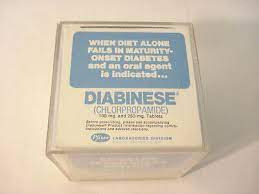
(Side note: if you have ever read Alas, Babylon (1955) there is a diabetic character who by today's standards clearly has type 1 diabetes, but wants to switch to the "new oral pill" (called "orinase" in the book, though they are likely referring to diabinese pictured above).)
From 1923 into the 1980s, insulin was given once or twice per day, and not particularly titrated to blood sugar. This was probably just because we didn't have a great way to measure blood sugar in real time. Pre-1970s, there was no way to test blood sugar outside of a lab setting.
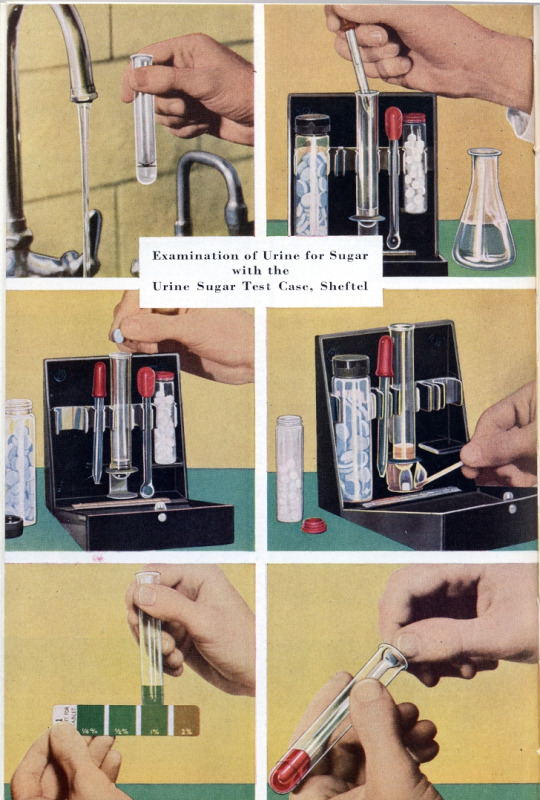
Urine testing was common starting in the 1940s, but was cumbersome as it required a flame for heating the urine. By the 1950s, a test had been developed that didn't require a flame, but was still not practical for home use. In the 1960s, paper strips were developed that changed color for different amounts of sugar in the urine. The problem with this was that the strips couldn't change color until there was sugar in the urine- a blood sugar level of over 200 by today's measurements. Low blood sugar readings were impossible at this time, and had to be treated based on symptoms.
In the 1970s, blood sugar could finally be measured by putting a drop of blood on a test strip, wiping it off, and matching the color of the test strip to a chart. While less cumbersome than urine tests, this was still something that would generally only be done at a doctor's office.

In 1983, the first home blood glucometer is developed. Finally, it was practical to take one's sugar multiple times per day, and it becomes possible to experiment with "sliding scale" insulin injections that keep tighter control of blood sugar. By the late 90s, continuous glucose monitors became available- though unlike today's CGMs that allow readings in real time on a smartphone or monitor, these had to be downloaded to a computer at regular intervals.
The 1980s were the first decade where insulin pumps become widely available. The very first pump was large and had to be carried in a backpack, but it represented a huge step forward in glucose control, as it more closely mimicked the function of a working pancreas than once-daily injections.
For the next 30 or so years you really had to work to qualify for an insulin pump, but recently it's been found that pumps greatly improve compliance with blood glucose control whether or not the person had good compliance before getting the pumps, and insurance has gotten better about covering them (though CGMs are still a pain to get insurance to cover).
The 1980s was also the decade that recombinant human insulin (insulin made by genetically modified bacteria) was first used. Up until that point the only insulins were pork and beef insulins, which some people had allergic reactions to. Recombinant insulin was closer to regular human insulin than beef or pork, and represented a big change in how insulin was made.
Today for people who take insulin to manage their diabetes, insulin is usually given as a single injection of a long-acting basal insulin, coupled with smaller doses of ultra-short-acting insulins with meals or snacks. This is the closest we've gotten to mimicking the way a pancreas would work in the wild, and keeps very tight control of blood sugar. This can be done by fingerstick blood sugar tests and individual injections of insulin, or it can be done with a CGM and pump- it just depends on the resources available to the person and their personal preference.
112 notes
·
View notes
Text
I'm trying to find gf bread recipes with longer fermentation times (I really miss the funky yeasty flavor of like, a ciabatta with a biga that ferments overnight) but so many of the google results are about how wheat sourdough has less gluten than other types of bread and is better if you're gluten intolerant. That's great for gluten intolerant people, but not helpful for me.
Frustratingly, adding "celiac" to my search term only makes the results less relevant, because 1) everybody is optimizing for any keyword related to 'gluten free' and 2) the fuzzy search algorithm Google adopted sometime in the past few years doesn't actually differentiate between "celiac", "gluten sensitive", "gluten intolerant," etc. Infuriating. Anyway, if you have any recs for CELIAC-APPROPRIATE, actually 100% gf breads that rise in the fridge or on the counter overnight, please send them to me. (Not looking to go full sourdough starter at this time.)
71 notes
·
View notes
Text
The flights and their major exports
Ice: furs, fish, culinary or food grade ice, unique and seasonal herbs, spices and flora that only grow there in the spring, super rich culinary culture has formed here and it attracts tourism and foodies, cooking oils and fats, seeds and nuts for consumption
Nature: lumber, meats, spices, fertile soil, insect cuisine, perfumes, freshwater fish, houseplants, seeds and shoots for farming, decorative plant or wood working, plant based oils for cooking or fuel
Light: wheat, plant based fibers and fabrics, paper and or papyrus, chalk and marble, huge bread and baked goods industry, baskets, porcelain, exotic percivore cuisine, pigments, seasonal fruits
Earth: cactus fruits, minerals and stones, gemstones, terracotta creations or construction pieces, ceramic work, glass tile work, roots and tubers, fossils, pigments,
Wind: rice, grains, construction grade bamboo, paper, rice paper, fabrics, plants and small birds for consumption, instruments (specifically wood-wind), silks, ribbon, sonorous sculptures
Shadow: fungal harvests, wire craft, tactical suits and mantles to conceal the body, iron weaponry with decorative detailing, insect and plant exports, huge root farming industry, lantern exports, candles, woodturned tools/utensils/decor/etc
Water: shells and abalone, fish, seaweed and kelp cuisine, boats and boat blueprints, crustacean cuisine, huge huge huge provider for the pescatarians, opal
Lightning: machinery parts, batteries, cactus harvests, insulation for both heat and electricity, exotic insect cuisine, dried and aged foods, electricity is produced in excess enough to provide immediately to the surrounding territories
Arcane: stained glass, lumber from the starwood strand (has unique properties and could be used for construction or artistic works), magical batteries made from the crystals, tomes and books, lenses, exotic herbivore cuisine, luminous pigments, tapestry work
Plague: immunizers/immunizations, craft and construction grade bones, leather, ale/mead/wine/whiskey/etc because they have the most intricate and detailed brewing and fermenting processes due to the understanding they have surrounding bacteria, pickled foods and pickling kits, surgical grade tools, cheeses, dry aged meats, medical practices unlike any other
Fire: weapons and armor, exotic carnivore cuisine, glasswork and glass blowing, obsidian and basalt export, geothermic energy(they can provide power enough to the surrounding territories) intricate mosaic and tile work, mineral exports, ceramic exports, blackened foods, metal shells and armor for vessels and vehicles and mounts
These are just what I can think of by examining the map and element at face value, there are millions of things these places can produce and export but I think these are the big ones or what they are known for, maybe even just the best quality versions of the export! If you want to use these ideas or add your own feel free!
288 notes
·
View notes
Text
What did Basque whalers eat at sea??
That's a question Montreal University researcher Sarai Barreiro has answered. Her team has analyzed the remains of buried Basque whalers in Red Bay and Petit Mecatina to find out.
From the documents that have lived to our days, we know fishermen were a well-defined special social group, with their own language and particular way of life. But theirs was a very hard job, their campaigns lasted up to seven months and involved a complete break with the homeland and the community that required a precise food management.
The most common food listed in Basque fishermen's contracts was sea biscuits (made from fermented wheat and baked twice, so as not to get moldy). The bakers of the towns were asked to have them ready for February or March, when it was time to go fishing for cod. Dried vegetables were also very common: lentils, beans, chickpeas, etc. Meat products also played an important role: bacon, jerky and other salted meats. Also dried sardines.

Basque fishermen had meat days and fish days; for religious reasons, they did not eat meat on Fridays and Saturdays. They also carried large quantities of olive oil, butter and wine, which were included in the daily rations. As various studies have shown, tastes were not the same among Basques. The people of Lapurdi, for example, preferred wine, while the people of Gipuzkoa and Bizkaia preferred cider and txakoli.
But once they arrived at the fishing grounds and landed, their daily diet would change mainly because those territories offered a better variety of food.
For example, isotopic studies of the cemetery at Saddle Island, extracting carbon and nitrogen isotopes from the skeletons of twenty bodies, provided information on diet: before they arrived in Red Bay they hardly took any marine protein and but once there it was the basis of their diet, especially fish, marine mammals, and seabirds.
[x]
#euskal herria#basque country#pays basque#pais vasco#euskadi#basque people#whalers#fishermen#canada#history#food
38 notes
·
View notes
Text
PSHYCHOCHROMIA
Seo Moonjo (Patient) x Reader! (Doctor)
Chapter 1: Hues of grief
"Motherhood is owning a second heart that beats outside your own body. It's joy, yet sorrow," mused Grandma Anastasia Song, a poetess with a first name as American as the apple pie from the small bakery down the lane and a surname as Korean as the homemade kimchi fermenting in the earthenware pots in her backyard.
She held Ae-ra close to her flaccid chest, completely absorbed in the pixelated murmurings of an old video from three weeks ago—a precious moment captured right inside the delivery room named "Ae-Ra's Grand Entrance!"
Though the image was shaky and Min Ju had, thankfully, skillfully avoided anything too anatomical, Anastasia saw your sweat-slick hair sticking to your forehead, heard your desperate cry, "I am doing it!" when one of the nurses urged you to push, and noticed a few droplets of blood on the surgical cloth—not many, but enough to create what her mother would have described as a "beautiful spectacle." Naturally, in English.
“A second heart, huh?” Sneering, you felt the spring in the tattered velvet armchair dig into your thighs while you watched as she moved in her rocker to become more at ease. With the hand she wasn't using to hold your daughter, she took another bite out of the freshly baked cookies that were cooling on the side table.
Gooey filling seeped down her chin and the delicate crust crumbled under her teeth and spattered in Ae-ra’s blanket as she rocked both of them—it tasted exactly how Mrs. Johnson's made them back home. Some tastes never really left her mouth or heart, even if she has been absent from America for decades.
“Yes, it is. A child means another heart. It expands to make room for all that love. And when they leave, well, it shatters a little too." She mused between bites. In the already hardened fabric of her sweater, there were small crusts of biscuit glued by saliva.
Once the recorder hummed to a stop and the grainy footage ended for the fifth time, you crouched in front of the vintage TV, fingers trembling slightly as you took out the video tape, taking care not to disturb the old thing.
“So, yes, you must be ready, dear. Your second heart is bound to stop beating very soon.”
Your breath stopped.
What?
Suddenly, the quaint house, with its worn-out red bricks and peeling white paint, felt too quiet, too still. The cheerful chirping of the sparrows nesting in the ancient birch tree outside, the rustling of the leaves in the wind that carried with it the scent of blooming azaleas, the distant laughter of children playing in the park down the cobblestone path—everything was drowned out by the deafening silence in the room.
Swiveling around, you observed Anastasia cradling Ae-ra, running her thumb, sticky with the remnants of the chocolate-covered cookie, over the tiny lines of your daughter's palm as if she were a cartographer mapping territories on a yellowing parchment. It was unsettling how calm she remained while predicting such a dreadful fate for her great-granddaughter.
"What happened, Halmoney? Is something wrong with Ae-ra?"
"No, no, nothing like that," Grandma reassured you. "It's just... time. Life is fleeting, my dear. It's like the wind blowing through a field of wheat: constant movement but soon gone before we know it."
Ae-ra cooed softly in her great grandmother's arms, blissfully unaware of the weight pressing down on your heart. She kicked her little legs playfully and batted at the lacy edge of her baby blanket, giggling when it swirled around her face like a cloud.
You watched as Anastasia smiled tenderly at her, wrinkles crinkling softly around her eyes, before they focused on the bright autumn leaves rustling outside. "Your grandpa is waiting for her in the afterlife now," she said quietly, "and soon she must join him."
Dumbstruck, you stood there, words failing you. Your mouth opened and closed in a futile attempt to voice your disbelief, much like a fish gasping for air on dry land. Your stupor was broken only when you felt the front of your blouse getting damp. Excess milk seeped through the fabric, making you look like a dairy cow in the middle of milking.
It was past time to feed your baby.
"For heaven's sake, don't say such things, Halmoney!” You exclaimed, clenching your chest in an attempt to stem the flow. Jesus, that was fucking painful.
Anastasia simply chuckled at your reaction, her wrinkled face crinkling even more at the corners. "You're as stubborn as your father, my dear. Always quick to deny what you don't want to hear. Just like that time when he refused to believe his favorite tree in the backyard had to be cut down. But truth, my dear, is like an ocean. It's vast, endless, and you cannot simply fence it off."
Then she turned her attention back to Ae-ra, her expression softening. "Now, come on, take Ae-ra and feed her. Unless you want your breasts to swell up like balloons. Believe me, you won't get to do this for longer.”
Inspired by the Sisters of the Harvest Moon, a group of women who, like the ancient Druids, found divinity in the waning of the moon and natural cycles, Anastasia's eccentric beliefs had their origins. They believed that mirrors were doorsway to fucking entire dimensions and that a child who looked too long into an old Venetian mirror would be blessed—or ill-starred, depending—with dreams of the future. The Sisters left an imprint on your grandmother 's life, seeping into her from 10 and extending well into her Doc Martens-clad teenage years until 18. They wore ropes on their belts—to beat, not to measure—and they never saw a child's ear in their way that they didn't want to twist.
Perhaps that’s why you didn't let out the primal scream building in your chest at that moment, your almond-shaped eyes wide as saucers. Because, in the end, her childhood was made out of convoluted beliefs and harsh discipline, and she wasn't predicting the death of your Ae-ra out of some perverse pleasure. In the end, she wasn’t trying to make you lose your grip on sanity; leap across the room and yank out the collection of vintage hair pins—an assortment of pieces from the 1950s, studded with tiny pearls—that were failing to control the silver curls haloing around her head in a style that would've made Einstein proud.
In the end, the old woman was fucking right.
It was June, the third year without your baby, and you were throwing up in a bed of hyacinths as if trying to expel the grief lodged deep within you.
You only knew they were hyacinths because Mom had some planted in your garden back in Jeju, and for days she talked about how the landscapers from the local 'Kim's Gardening Services' put them in lopsided. You didn't know flowers could be lopsided. That's what you thought about as you sat there in the dirt, staring dizzy at the flowers, wet and blue and bright.
Outside Westlake Psychiatric Ward, an iron and gray monolith with no dreams or aspirations, the hyacinths had been planted.
It was located in the oldest part of Gonjiam Hospital. The original Victorian-style brick building had long been surrounded and swallowed by larger and generally uglier extensions and annexes. "The Caged Mind Asylum" was at the heart of this complex. The only indication of the dangerous nature of the occupants was the row of security cameras perched on the fences like vigilant birds of prey.
At the reception, every effort was made to make everything seem quite friendly: ample blue sofas, rustic and childlike paintings and drawings of the patients hung on the walls. It looked more like a garden to you than a forensic psychiatric hospital for jailed people whose families had abandoned them because they could not afford the hefty cost of adult diaper changes and the fact that, besides being criminals, they were out of their minds.
It's strange how quickly we adapt to the frightening world of a psychiatric hospital. We become increasingly comfortable with madness—not just the madness of others, but our own. You believe that we are all mad, just in different ways.
And that's why—and how—this place was more than just a place—it was a job. You, Song Y/N, with your PhD from Seoul National University and your internship at Massachusetts General Hospital, were supposed to be inside. You were meant to be standing tall and confident in front of the imposing white doors on your well-tailored scrubs. Instead, you were outside, staring at a puddle of puke and trying to catch your breath. And the sky was falling—wet, wet and blue and bright.
Soon enough, your husband, or what was left of him, would come looking for you to ask how your day has been with his usual pathetic monotone, and you'd have to summon a convincing smile. You'd avoid telling him that your day has been merely a puddle of clear water mixed with remnants of your breakfast—crunchy slices of apples from Mrs. Lee's fruit stall and homemade kimchi. Then, you'd steer his attention to something mundane, something safe—like the weather or the incessantly leaky faucet in the kitchen that the local plumber promised to fix since last Tuesday.
There are many reasons why you ran out of that place for crazy people like you, but here's the overarching one. The only one that really matters.
Ae-ra.
How can a tiny four-year-old, with a presence so radiant and a laugh that echoed like a cathedral bell, be gone so soon and be silenced so abruptly?
It's been three years. Three years of questioning, of doubting.
There is no reply from Him. Never. Not even a whisper in the wind nor a hint in the rustling leaves. The Almighty remains silent, devoid of answers. Every time you have screamed, raged at the sky, your voice echoing against the hard concrete of the city buildings, there is only silence returned. You call out names like "God," "Jehovah," and "Yahweh," clutching your rosary beads bought from the small gift shop adjoining St. Peter's Basilica during your honeymoon in Rome.
Every night, under the vast expanse of the inky sky, you wrestle with the notion of divinity. Your fists clenched, your knuckles white, the metal of your wedding ring biting into your skin.
What you remember most about those early years was the sheer physicality of it all. Small fingers on the cheek. A belly on a hip. Legs climbing onto the lap. A hand slipping silently into your own. And all this amid the haze of sleeplessness. It was Min Ju who slept badly, but Ae-ra had her moments. And for what seemed like months, mornings would shock you awake, finding the three of you sprawled across the sheets like battered objects washed up on the shore. Yet there was such joy in that physicality. Bodies entwined. Pressed up against each other. Safe.
No amount of medication or counseling at the esteemed Johns Hopkins can satisfy the void that exists right now.
Shit, you’re not even a romantic; you never have been. Poetry and grand gestures are not things you believe in. But this... this is a different kind of story. A story of love that no heart can forget. Not when it loves somebody that way, and not when it still beats for them even when they are no longer around.
And so, you live quietly, one day at a time, with a scar that no amount of time can heal—a wound that is always fresh. But that's fine because you've lived through entire disasters in silence, you know how to create silence. It's like this: turn on the radio very loudly, then suddenly turn it off. And so it captures the silence. Starry silence. The silence of the moon changes. For everything, you created silence. It is in silence that the noise is heard more. Between the hammerings, you heard the silence of your grief and your blood pumping through your arteries.
Because, in the end, isn't that what survival is all about?
“Doctor?”
Since your childhood, Mom has often told you about your peculiar habit of associating colors with feelings, people and events—a trait that you had passed onto your daughter. Both of you stood out like sore thumbs in the conventional world.
Ae-ra had been the subject of many parent-teacher meetings and counseling sessions. However, you never felt the need to consult a doctor, as you knew it was an inherent trait, not a disease that could be cured with pills. Maybe the influence of Anastasia and The Sisters had seeped into both of your lives more than you realized.
For both of you, everything had a distinct color. It wasn't simply about the physical appearance, like a tree being brown and green. No, it was more profound than that. If a flower was dying, then its color would be a sickly gray. If a bird was bound to die, its red feathers would be spotted with black. If a person was brimming with happiness, the fingertips they used to cover their mouths would radiate a bright, sunny yellow.
At the moment, as strange as it might sound to others, the voice that called out to you reminded you of the creaky floorboards that groaned under your father's weight as he entered the house after a hard day. Blue on the porch, but within the brick walls: red, the same shade as the dinner table cloth that often became more interesting than meeting your family's gaze.
It was a voice that jolted you back to reality and made you turn your head with a sense of urgency, away from the flowers and the vomit. It was a voice that belonged to Nurse Jungwoo.
Blue was stitched to the courteous tilt of his head when he greeted the other nurses and staff, the soft-spoken words he used to comfort manic patients, and the gentle touch of his hands while administering medication. But you had observed a shift in him sometimes, particularly when he'd watch people engage in heated squabbles over dumplings left on the lunch tray or when he had to bathe former soldiers haunted by the ghosts of their pasts—his normally calm demeanor would turn a burning red, his eyes narrowing and lips pressing into a tight line as he fought against the men’s screams and pushes.
The transformation led you to ponder if one day you might see these white labyrinthine corridors stained with the purple hue of his frustration, or if you might stand at the end of a confessional room and see his purple fingers wrapped around a gun, pulling the trigger without hesitation. Just like your father had done.
"Are you okay, Dr. Song?" Yoon's voice held an awkward concern. His usual shy smile, the one that reminded you of a child peeking out from behind their mother's skirt, was replaced by a worried frown. "You've been sitting there for a while now. Can I get you some water? Or maybe a cup of chamomile tea from the cafeteria? It's surprisingly good, you know. They just got a new brand— Twinings, I think it's called. Very soothing."
After glancing at his outstretched hand, its end slightly stained with the pale blue ink from the Bic Cristal ballpoint pen he preferred for taking notes, you looked at his face and then at your heels, partly covered in grass and dirt.
Politely rejecting his offer of assistance as well as his worried smile, you got up, dusting the dirt off your coat. His concern was touching, but unnecessary. You gave him a gentle pat on the shoulder to let him know that you were grateful, though.
Fishing a battered packet of Marlboro cigarettes from your pocket, you realized you'd been more than a week without smoking—you had sworn to yourself that this time you were quitting for good. But, hey, here you were, faltering already.
You lit one, irritated with yourself. Any therapist worth their salt would see smoking as an unresolved dependency—something that should've been dealt with and overcome long ago.
"You sure I don't have another patient to attend to now?"
Grass crunched beneath your heels as you shifted your weight, the vomit now concealed beneath a layer of disturbed soil.
With an arched brow, you watched as Jungwoo curled into himself, his hands disappearing into the pocket of his pale green scrubs. You knew why. Your gaze was a soft, heavy paw on him. But if the paw was soft, it took it all away, like that of a cat that hurriedly grabbed a mouse's tail. The drop of sweat went down through his nose and beautiful mouth, dividing his smile in half. Just that: without an expression, under your mascara coated eyelashes, you were looking at him.
"So…” You leaned against the wall, the cold bricks biting into your back.
"Oh… Yes, yes! I apologize, Doc. You do indeed have a new patient, though I don't believe it's one you will be particularly eager to attend to.” Jongwoo responded, bouncing on the ball of his feet, one hand still tucked behind his back.
Your lips curled up in a humorless smile as you took another puff of your cigarette. "I'm never eager to attend to criminals, Jong. So, who's the unlucky soul that has the pleasure of my company next?"
“Officer Hwa brought this one from the maximum-security jail downtown. The one in barbed wire and manned by guards that look like they eat nails for breakfast?" Yoon attempted humor, but it fell flat, and his eyes flickered with regret.
“And?”
“Well... It's… Seo Moonjo.”
Psychopathy, in bygone times, was synonymous with the concept of "evil." Individuals who reveled in inflicting harm or death on others have been chronicled since the time Medea took up an axe against her own offspring, and likely even prior to that. In 1888, the same year Jack the Ripper held London in the grip of terror, a German psychiatrist coined the term "psychopath" from the German word psychopatische, literally translating to "suffering soul."
This clue—the idea of suffering—was your gateway into understanding that these monsters were also in anguish. Viewing them as victims rather than perpetrators enabled a more rational, compassionate approach in your dealings. Psychopathy or sadism didn't just spring into existence from nothingness. They were not viruses, randomly infecting someone out of the blue. They bore a history, a prelude rooted in childhood.
Your belief was that experiences such as bruising knees from running in the backyard or losing a tooth soon to be claimed by the Tooth Fairy, were reactive. This means that to truly empathize with another human being, we ourselves must first be shown empathy—most importantly, by our parents or caregivers.
And Moonjo? Seo Moonjo seemed the type of man that naive young girls would send love letters to, sealed with their cheapest lipstick or a pair of lace panties. Because, despite his monstrous deeds, his square jawline, sharp features, and the way his tailored suits highlighted his lean physique rendered him attractive in the eyes of many.
Just yesterday, after returning home exhausted, brain pounding on your skull because Min Ju couldn't bring himself to sign the divorce papers, feet bloated, you watched in the news as women who had once trusted him with their children's dental care were now protesting in front of the prison. They claimed he was an angel, a helper sent by God.
But, hell no. Moonjo was no angel. He was a beast, a wolf in sheep's clothing, concealing his true nature behind the pristine white of his doctor's coat. His dental procedures were carried out with a precision that was unnerving. Seo Moonjo was a cannibal, a murderer, and a pyromaniac who eradicated his adoptive family in a spectacle of blood and fire.
Of course, you had dug deep into his case, folded the paper news, and pushed it in between the convenience store bench's slats. It was what your mother called a scandal sheet, full of the local murders he had committed and fake suicides and beatings and robbings, and just about every page about the deceased twins and that weird porn addicted man that lived with Moonjo in the Eden Studio had a half-naked lady on it with her breasts surging over the edge of her dress and her legs arranged so you could see to her stocking top or cats with their small, shiny guts exposed in trash bags.
From this extensive research, you suspected that there had been no one in his life—a caring grandmother, a favorite uncle, a benevolent neighbor, or a mindful teacher—to see his pain, to acknowledge it, and to help him process it. Anger, fear, and shame were too dangerous for the small child to deal with on his own. He didn't know how to deal with such emotions, so he didn't. Instead, he disowned these feelings; he didn't allow himself to experience them. He sacrificed his true self, along with all that unfelt pain and anger, to the Underworld, to the murky world of the unconscious.
This resulted in him losing touch with who he really was. The man, who was impeccably polite, genial, and charming, was provoked somehow. And the terrified child inside him lashed out in response, reaching for a knife and a lighter.
Moonjo could be a suffering soul.
Right?
Damn it. Just stop. You're already pushed to your limits, and you can't afford to shoulder his case either.
“Look, honey. I'm already swamped with other patients. It's just not feasible to add Seo Moonjo to my already overflowing plate. Can you imagine the added stress?" You mutter, eyes squinted shut, as you picture the growing pile of patient files on your desk. "Remember that Kwon guy? The one who had a schizophrenic episode and killed someone? Or that Kyung girl who defended herself against her rapist? Those were hard, sure. But Moonjo—he's on another level. He's someone who has committed a series of heinous acts and revels in them. This isn't like juggling a couple of extra appointments or adding a few more hours to my workday. This is like... like... stepping into a goddamn war zone without any armor!"
Suddenly, as you started to pace around the garden, an idea struck you. Your eyes snapped open, the cigarette almost fell from your lips and you swiftly turned to Jungwoo, who was watching you with wide eyes. "You remember that doctor, don't you? That one with the crooked nose?"
“Dr. Jung Hyun-Jae?”
“Yes, yes… Dr. Jung would be a more suitable choice for this case. He's been needing more challenging assignments, hasn’t he? It would be a perfect opportunity for him to sink his teeth into a complex case. Plus, it might distract him from his recent fixation with Nurse Ioona. She's been complaining about his constant attention. Where's Officer Hwa? I need to explain the situation to her and suggest Dr. Jung as an alternative.
Jungwoo’s eyes darted around nervously before he settled them on a pretty lavender (how ironic it was, right?) from the garden. He reached out for it and gently twirled the stem between his fingers. “Well… Officer Hwa left. She did want to speak with you and rambled about how you were the only one capable of handling Seo Moonjo, but… I noticed you sneaking out through the fire emergency door and figured you were trying to avoid any additional work or confrontations. So I went ahead and filled out Moonjo’s report. Your first meeting with him is scheduled for today. It's on your wall calendar, right under the post-it note about picking up milk and eggs.”
Your heart skipped a beat at his words, the news catching you off guard.
This son of a bitch. Motherfucker. Idiot.
You clenched your fists to stop the urge to transform him into a purple puddle of limbs for real now. He was still new, still learning the ropes. And there was a good intention behind his actions. So, instead of lashing out at him, you sighed heavily and crushed your cigarette beneath your heels. You were in for a long day.
"Alright. Just...alright. But I'll need to juggle my schedule around, shuffle some patients here and there. This is going to be like solving a Rubik's cube blindfolded.” You muttered, rubbing your temples with the base of your palms, the onset of a stress-induced headache making itself known.
“He's out on the patio. Chained to four officers and three nurses because he asserted his right to a smoke break. Should I fetch him while you change your coat and prepare yourself for the consultation?" Jungwoo asked, his gaze shifting from the crushed purple petals in his hand to your clothes.
Change?
Looking down, you noticed the stain of vomit on the fabric of your lab coat, a gift from your husband on your first day at work. It had your name, Dr. Song Y/N, stitched in an elegant script on the left pocket. Fuck. Fucking great!
“Please, honey. And bring me some black coffee if you can; make it extra strong. I hate tea, it reminds me of the cough syrup my mother used to force down my throat as a child," you replied to Nurse Yoon without even looking at him again. Blood had risen to your face, now so hot that you thought you were with your eyes injected, while he, probably in new deception, should think that you were colored because of the cold wind.
What type of image were you inside his bambi eyes? A grieving mother or an insolent doctor?
Let's spin the Lucky Wheel, shall we, Mrs. Song?
Jungwoo, ever the diligent worker and one not to mingle in your business, had the courtesy to look sheepish as he handed over a thick manila folder (one that you weren't sure you had seen him bringing with him) stamped with the words "CONFIDENTIAL: SEO MOONJO.".
"I will, of course. But, first, here's the case file, Dr. Song. I've highlighted the most important parts," he said, extending the massive file towards you as if it were a bomb about to explode. The folder was thicker than the latest edition of the Diagnostic and Statistical Manual of Mental Disorders, a psychiatric bible that you often referenced. Its contents, as you anticipated, were likely far more disturbing.
"Thank you, Yoon. I appreciate it," you sighed, taking the heavy folder from him. You opened it, your eyes scanning over the pages filled with police reports, psychiatric evaluations, and a collection of distressing photographs that made your stomach churn. All evidence of Moonjo's crimes.
"Also," Yoon continued, biting his lower lip in a nervous habit you were becoming all too familiar with, "I've arranged for some extra security during your consultation with him. Officer Hwa insisted, said it was non-negotiable. I hope that's alright."
You nodded, appreciating the concern, although you couldn't help but feel a pang of annoyance. The last thing you needed was more people watching and more eyes to witness your struggle to maintain control. But you understood—the higher-ups wanted to ensure no harm would come to their staff at the hands of a dangerous psychopath.
Or maybe they just didn't want another bloody body in this institution and lawsuits on their hands.
After a significant period spent working within the asylum, it became evident to you that even in a place of death, there existed a social hierarchy. In comparison to the general hospital wings, the accommodations located in the main building were significantly larger and more expensive. Suites were rooms named after well-known Seoulites that had once been in the psychiatric unit, home to one of Korea's most notorious sociopaths. The Bah Suah suite was where Seo Moonjo was staying. To get there, one had to navigate past the under-stair canteen, home to vending machines offering various food and drink options and hard plastic chairs.
What was most crucial, however, was shedding this ugly uniform.
Your office was located in the oldest, most decrepit part of the hospital. Spiderwebs clung to the corners, and several corridor light bulbs were burned out.
As soon as you turned the doorknob, the door creaked open. The first thing that prompted a slight smile was the smell inside. It was distinct from the rest of the hospital. It didn't reek of antiseptic or bleach; instead, it oddly reminded me of an art gallery. A blend of canvas, paints and brushes, varnish, and wax. It took a moment for your eyes to adjust to the dimness, revealing an unfinished artwork leaning against the wall—an unexpected object within a hospital. About twenty metal art shelves stood out in the shadows, and on a table, a pile of both your sketches and those of patients towered upwards—an unstable tower of paper reaching for the sky.
It had been a considerable amount of time since you had leaned over a canvas, staining your fingertips and the tip of your nose with hues of color. The inspiration simply wasn't there anymore. The paintings gradually lost their meaning. Even when Min Ju would sit in a chair and watch you work after a shift at the firm, nothing changed.
For years, even before your marriage, you enjoyed painting his face. Strong jawline, pronounced cheekbones, elegant nose—sitting under the spotlight—he resembled a statue. A hero. However, something was off nowadays, and you couldn't tell what. Perhaps you were forcing the issue. You couldn't capture the shape of his eyes or their color accurately. The first thing you noticed about your husband when you met was the sparkle in his eyes—like a tiny diamond embedded in each iris. But now, you couldn't capture it. Without corresponding to his entire face, the brown eyes were intraducible. As independent as if they were planted in the flesh of an arm, and from there they looked at you: open, wet.
It might be a lack of talent, or maybe Min possesses something more that doesn't translate into a painting anymore. It all came out lifeless every single time.
Well, maybe because that was what he had become for you: a dead entity, lifeless, a walking shadow that prefers clandestine meetings with the girl next door—Kim Ji-ah, the one who sold Dabang coffee from her little shop—rather than signing the divorce papers and emptying your house of his remnants. You yearned for him to take his collection of smelly socks, stained shirts—and god, those lipstick marks that were an egregious shade of red—and just leave. Useless.
Dropping the huge file somewhere in the mess and slipping into a fresh coat, you caught a glimpse of the note left by Jungwoo. Precisely where he promised it would be. Pinned to the wall calendar, right beneath the post-it note about the local grocery store—a place you could never bring yourself to enter, not without your gaze drifting towards the adjacent drug store, contemplating the prospect of acquiring an unhealthy amount of Paracetamol.
"Consultation 1. Seo Moonjo at 3 p.m." accompanied by a cartoonish drawing of a devil's face and a pitchfork in red marker—the kind of doodle one would expect from a schoolboy, not a professional nurse. You couldn't help but laugh at the irony of it.
Stepping out of your office, you felt the familiar cold air of the hospital corridors creep into your bones. The aged linoleum floor creaked under your weight as you made your way towards the Bah Suah suite. It was a walk you had done countless times, but with the impending consultation with Seo Moonjo, it felt different, heavier.
Navigating through the maze-like corridors, you passed by the under-stair canteen, which was buzzing with the sound of vending machines dispensing Lotte Choco Pies and cans of Chilsung Cider. Nurses and staff were huddled in corners, whispering about the latest hospital gossip over cups of instant coffee. Their eyes flickered towards you, hushed whispers growing quieter as you walked past them. You paid them no mind.
Just as you rounded the corner of the last hallway, you almost collided with Nurse Park Ji-Yeon, a recent graduate of Yonsei University's Nursing Program. Her arms were filled with a stainless steel tray laden with countless medication cups and water glasses and you noticed how her hands were stained lime green. Youthfulness, naivety and playfulness.
“Dr. Song, I didn't... I didn't expect to see you here," she stammered, her cheeks flushing a red that was reminiscent of the cherry blossoms that adorned the hospital grounds in the spring. You admired Ji-Yeon's work ethic and dedication; her timidity was often eclipsed by her eagerness to learn and assist patients. She was like a mirror image of your younger self, fresh-faced and pretty much graced with green.
"You need to watch where you're going, Ji-Yeon. Those are important medications you're holding," you advised her, bending down to pick up a bottle of pills that had rolled under a rusted hospital bed. Sertraline, prescribed to Mr. Kim in Song Joong Ki. You placed it back on her tray, ensuring it was secure.
"I will, Dr. Song. I apologize," she replied, bowing as charmingly as she could muster while equilibrating glasses of water. "I was just heading to administer afternoon medications to the patients in Ward C when… I heard about your consultation with Seo Moonjo," she said, her voice dropping to a whisper, as if the mere mention of Moonjo's name would summon him. Her eyes flickered at the closed door where the meeting would happen. “Is it true that he...that he indulges in...cannibalism?"
Your fingers massage your temples, a dull ache throbbing behind your eyes. Great. The rumors about Moonjo were spreading rapidly in the hospital's atmosphere like a malignant tumor . "We shouldn't speculate about patients, Ji-Yeon. It's unprofessional and contrary to the Hippocratic Oath we took."
"But he's a monster, isn't he?"
"Every patient, regardless of their actions, is a human being first and foremost, Ji-Yeon. The term 'monster' has no place in the lexicon of a healthcare provider. It's our duty to provide care and treatment without judgment or prejudice."
You’re so hypocritical, Y/N.
"But what about the things he's done? The people he's hurt?"
"Even so," you retorted, "our job is to heal, not to pass judgment. Justice is the court's responsibility, not ours. We are here to ensure that he is physically healthy and to provide the medical aid he requires."
Before she could respond, you waved her off dismissively, effectively ending the conversation. "Now, get going. Those medications won't be administered themselves. And who knows, Seo Moonjo might be coming to look for his pills," you admonished, leaving the young woman standing alone in the corridor, her mouth agape in stunned silence.
Two minutes later, you arrived at the Bah Suah suite, the heavy metal door cold under your touch, signaling that the old AC was already running. Taking a deep breath, you steeled yourself for the consultation and pushed open the door, stepping into the room that soon would hold the man known as the 'Cannibal Dentist' of Seoul.
The therapy room was a small and narrow rectangle, as empty as a prison cell, or maybe even more so. The window, barred, remained closed. On the little table, a shocking pink box of Kleenex tissues stood in stark contrast with its cheerful color—it must have been left there by Mrs. Chen; you couldn't imagine Jungwoo offering tissues to the patients.
You sat in one of the two faded and battered Eames lounge chairs. Minutes passed. No sign of Moonjo. What if he didn't show up? Maybe he hadn't agreed to meet you yet; maybe he hadn't finished his pack of Marlboro. And he'd be totally within his rights.
Impatient, anxious, nervous, you gave up sitting and suddenly stood up and went to the window. You looked out through the bars of the grid. The yard was three floors below. The size of a tennis court, it was bounded by large exposed brick walls, too high to be climbed, although undoubtedly someone had already tried. Every afternoon, the patients were led there to get fresh air for half an hour, whether they wanted to or not, and in this cold weather, it would be understandable if they resisted. Some isolated themselves, talking to themselves, or walked back and forth like restless zombies, going nowhere. Others formed groups, chatting, smoking, arguing. Voices, shouts, strange excited laughter reached you.
At first, your eyes failed to pick him out. It was only after scanning over the throng of people that you spotted him - a tall figure, as pale as the moonlight, leaning nonchalantly against the brick wall of the patio. A predator perfectly at ease in the midst of his prey.
Jungwoo navigated his way through the crowd, making a beeline for him. He exchanged a few words with the nurse stationed closest to the infamous serial killer - a petite woman named Eun-ji with a heart-shaped face and a sharp bob cut that framed her face. She nodded, her eyes wide behind her rectangular glasses.
Yoon approached Moonjo with extreme caution much like a wary zookeeper approaching a particularly unpredictable animal. You knew exactly what he would say, you had rehearsed it with him other times. He would inform the towering man that you, the in-house therapist, had requested a meeting with him. He would emphasize that it was a request, not an order.
Moonjo remained as still as a statue as Jungwoo spoke, offering no indication of agreement or refusal. That was a good sign, you thought.
After a moment that felt like an eternity, Yoon Jungwoo turned on his heel and retreated, his hands buried in the pockets of his scrubs. A sinking feeling of defeat washed over you - he wasn't coming. You berated yourself internally for being so naive. This had been a colossal waste of time and energy, and you had missed your precious 30-minute power nap for this fiasco.
But just as you were on the brink of surrendering to your disappointment, to your utter surprise, Moonjo stirred. He took a step forward, following the retreating figures of the policemen and nurses across the courtyard until they were swallowed up by the hospital’s imposing structure.
So, he was coming after all. You cleaned your hands in your jeans and put your hands on your knees to stop your legs from bouncing. You tried to quieten the nagging voice in your head, the voice that sounded uncannily like your father, chastising you for not being good enough, calling you a fraud, asserting that a woman's place was in bed, awaiting her husband's return from work, naked and submissive.
Shut up, you thought, repeating it over and over: Shut up, shut up…
Two or three minutes later, there was a knock on the door.
"Come in," you called out.
As the door creaked open, the personification of the monstrous deeds you had meticulously studied in countless newspaper clippings and confidential case files stepped into the room. His imposing figure, garbed in the standard-issue uniform of the Westlake Psychiatric Ward—a drab ensemble of worn-out hues that could only aspire to be called beige—filled the doorway. His eyes, the first thing you notice, were a striking shade of obsidian and held an unsettling gleam as they flickered over the confines of the consultation room before settling on you.
Words precede and overtake you; they tempt you and change you, and if you're not careful, it will be too late. Things will be said without you having said them. Or, at least, it wasn't just that. Your entanglement comes from the fact that a carpet is made up of so many threads that it can't resign itself to following just one thread. Your entanglement comes from the fact that this story is made up of many stories. And not all of them can be told—a truer word could, from echo to echo, bring your high glaciers crashing down the gorge. So you will no longer speak of the drain that was in you while he was staring at your face. Otherwise, you will think about how headlines or news articles could never do justice to the presence he commanded. His skin was luminous, almost translucent—a canvas of alabaster with the occasional vein peeking through the surface, like coloured threads embedded in white marble. He was a statue that came to life.
Moonjo’s raven hair, unconventional in its length for a man, covered his nape and framed his forehead in an innocent way. His smile, filled with teeth, was clear of any obstructions, allowing you to glimpse the unique shape of his insanity—water and desert, populace and wilderness, abundance and need, fear and challenge. Moonjo has in himself the eloquence and the absurd mudness, the surprise and the antiquity, the refinement and the roughness. Moonjo is baroque.
Still, right now, he is the first thing in your whole life that you look at and see no ounce or mention of color.
"Good afternoon, Dr. Song.”
"Good."
You locked eyes with him, noting the spark of anticipation dancing in his gaze, before shifting your attention to the small assembly of officers and medical staff flanking him. Jungwoo is curling into himself while holding a paper bag from the cafeteria in his hand. This wouldn't do. Screw Officer Hwa and her requests; you wouldn't attend to someone while being vigilated like this.
Officer Park Seo-Jin, a woman as stern as the harshest Spartan matron, with her sharp, hawk-like features and a redish hair and attitude that brooked no nonsense, met your gaze. Adjacent to her stood Nurse Lee Min-Ho, a fresh addition to the hospital staff, nervously clutching a clipboard. He was a blue one.
Maintaining your gaze on Officer Park, you said in a firm voice, "Officer Park, I would like to conduct this consultation with Mr. Seo in privacy. You and your team may wait outside, perhaps in the waiting area. There's a coffee machine that makes a decent brew."
The officers exchanged surprised glances, clearly taken aback by your request. Officer Park's frown deepened, her lips forming a thin line as she locked eyes with you. "Dr. Song, with all due respect, I don't think that's a good idea. Given his history and Officer Hwa’s requests, it's better if we—"
"I understand your concerns, Officer Park, but I assure you, I can handle myself. I've been trained to do so. I believe Mr. Seo here can attest to that."
Moonjo tilted his head and smiled like the Cheshire cat as he noticed the thick file on the table behind you, eyes traveling over it greedily, like a grade-schooler staring at a chocolate fountain. He knows what lies inside. And he was fucking entertained. "She's right. I don't bite...unless provoked."
Officer Park looked like she was about to argue further as she shot a glare at Moonjo—a glare so icy it could rival the sub-zero temperatures of the Arctic tundra—but you held up a hand, stopping her.
"I appreciate your vigilance, but I've dealt with patients similar to Mr. Seo before. My training is extensive and comprehensive. I know what I'm doing. Please wait outside."
After a moment of silence, Officer Park reluctantly agreed, her gaze lingering on you with a mixture of concern and admiration. "Let’s go then, boys. Out we go, or Miss Cold here will chop our heads off," she grumbled, shuffling towards the door. She paused at the threshold, her hand on the knob, before turning back to look at you. "You call us the second he steps out of line, you hear?"
“Sure.”
Reluctantly, the officers and nurses filed out of the room and as the door closed behind them, Jungwoo handed you a cup of black coffee, brewed with beans from a local roaster. The mug was warm in your hands, the black liquid inside steaming and swirling. It was just as you liked it—strong and bitter.
"Thank you, Jungwoo," you said, accepting the coffee. "And...thank you for understanding."
With a nod and a faint, yellow smile, Jungwoo retreated. He cast a last glance at you and Moonjo, his brows furrowed in worry, before finally disappearing behind the door.
As the door closed behind Seo Moonjo with a dull thud for the second time, echoing through the empty therapy room, the canvases on the wall seemed to lean in curiously, like ghosts that had seen better days. He walked with a hunched gait, shoulders slightly rounded, hands clasped together behind his back—an unsettling calmness about him that chilled you to your very core. Now, just the two of you, the air felt colder than before he entered, like he brought along a personal blizzard that set your nerves on edge.
Slowly, he takes a seat across from you, his legs crossed at the knee elegantly, like an art model posing for a painting session. His hands were large, rugged and bruised with what looked like fresh scratches from tools or rope. It took all of your self-control not to recoil at the sight of them. He leaned forward slightly, folding those monstrous hands on the table between you, atop a worn-out copy of Freud's 'The Interpretation of Dreams', and locked eyes with yours - unblinking, unwavering.
A moment passed where neither of you moved or spoke. You could feel his eyes raking over your face, examining every line and shadow on your own. It was disconcerting how easily he made eye contact. You forced yourself to return it, resisting the urge to shield yourself with your pencil and notepad. You wished you could paint over this unnerving moment, transform it into a stunning piece of art, and hang it in the vibrant hallways of the Louvre rather than being trapped in this dreary room.
Therapy is not your forte; art is your passion. But here you are, trying to understand this man who's been called a monster by everyone outside these walls. Inside them too? Who knows? Maybe there's more to him than meets the eye... or maybe they're all just stories that should never be told in this place that reeks of silence and stares back at you like a judgmental wallflower no matter what you do or say next to Seo Moonjo right now.
"Well then, Mr. Seo. Shall we begin?"
“Of course, jagiya.”
#lee dongwook x fem! reader#lee dong wook x reader#imagine#lee dong wook#lee dongwook x reader#jeong jian#seo moonjo x reader#seo moonjo#hell is other people#strangers from hell#hot as hell#yoon jongwoo#min jieun
41 notes
·
View notes
Text
Emperor's Smile | 天子笑
How could I not make a post regarding Wei Wuxian's love for alcohol, more precisely about the iconic Emperor's Smile.
What is the Emperor's Smile:
Emperor's Smile (天子笑, Tiānzǐ Xiào) is a liquor sold in the city of Gusu where the Lan Sect is located.
The Wei Wuxian's Emperor Smile Tea is a black tea infused with Burbon, Rooibos, Ginger, cardamom, nutmeg, cloves, cornflowers, calendula, and vanilla. It has a very faint smoky flavor and when you drink it, it takes you to the burial grounds.
Lan Wangji describes the taste as fragrant and mellow.

Emperor's Smile history in MDZS:
Although liquor is forbidden in the Cloud Recesses, as a student Wei Wuxian repeatedly breaks curfew to smuggle Emperor's Smile into the residence to share with his friends (Jiang Cheng & Nie Huaisang).
At the Burial Mounds, Wei Wuxian and Uncle Four agree that Emperor's Smile is indisputably the best wine they have tasted.
After Wei Wuxian's death, Lan Wangji purchases Emperor's Smile and drinks it for the first time. Though he does not like the taste, he understands why Wei Wuxian does.
Lan Wangji then keeps seven or eight jars of Emperor's Smile hidden beneath a floorboard in his room. However, upon his return to the Cloud Recesses, Wei Wuxian promptly discovers and drinks two jars of the wine, and refills them with water as a prank. This turns ironic later when Lan Wangji fetches Wei Wuxian two jars to drink, yet the two jars are water-filled jars. Lan Xichen, notably, sees the alcohol and allows it despite the rule against drinking.
After returning to the Cloud Recesses as a married couple, Lan Wangji keeps Emperor's Smile in the Jingshi for Wei Wuxian to drink.
Equivalents:
I somehow want to assume Emperor’s Smile is Baijiu (白酒), a Chinese liquor (or grain spirits). It is a colorless liquor typically coming in between 35% and 60% alcohol by volume (ABV).
It is distilled from various grains like sorghum, rice, wheat, corn, and/or millet. Every kind of baijiu uses its own type of qū for fermentation to create a distinct and characteristic flavor profile.
The four main "types" are defined as the rice aroma (a floral, light flavor), light aroma (a sweet, floral taste), sauce aroma (a sharp taste akin to soy sauce), and strong aroma (spicy and fruity).
Prices vary a lot depending on where you live and the brand, it can go as cheap as a can of beer up to thousands.
Note: I don’t have that much knowledge of alcohol as I rarely drink, so I tried my best by doing research.
▷MDZS Home Page
[ completed ; 13/07/2024 ]
★ ⁺. ໒꒰ྀི。- ˕ -。꒱ྀི১ ૮꒰˶ᵔ ᗜ ᵔ˶꒱ა ˖⁺‧₊˚
#the untamed#mo dao zu shi#wei ying#wei wuxian#lan zhan#lan wangji#hanguang jun#yilling patriarch#mdzs manhua#mdzs novel#mdzs#the grandmaster of demonic cultivation#cql#emperor’s smile#gusu#wei wuxian drinks a lot
24 notes
·
View notes